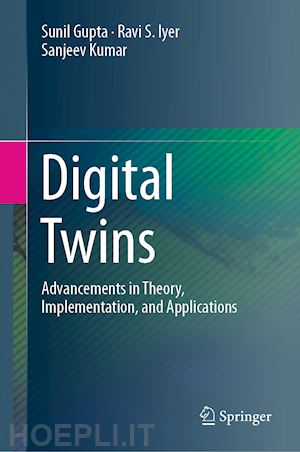

Questo prodotto usufruisce delle SPEDIZIONI GRATIS
selezionando l'opzione Corriere Veloce in fase di ordine.
Pagabile anche con Carta della cultura giovani e del merito, 18App Bonus Cultura e Carta del Docente
Digital twin technology has been rapidly evolving and gaining popularity in various fields such as manufacturing, energy, healthcare, and transportation. Digital twin is a virtual representation of a physical system or process that enables real-time monitoring, analysis, and optimization.
This book will provide a comprehensive understanding of digital twin technology, its advancements, and applications. It will be useful for researchers, academics, practitioners, and students who are interested in the fields of engineering, computer science, data analytics, and Industry 4.0.
Chapter 1 Digital Twin: Theory and Concepts.- Chapter 2 Digital Twin Challenges.- Chapter 3 Digital Twin Implementation: Architecture and Development.- Chapter 4 Digital Twin: Applications.- Chapter 5 Modeling of Digital Twins.- Chapter 6 CyberTwinAI: Enhancing Security and Efficiency in Industry 4.0.- Chapter 7 Digital Twin: Implementation.- Chapter 8 Future Directions of Digital Twin Technology.
Prof. (Dr.) Sunil Gupta is a known academician and researcher with more than 20 years of rich experience in teaching, research, and industry related to Computer Science and Engineering. An alumnus of the prestigious National Institutes of Technology, Jalandhar, and NIT Hamirpur, Dr. Gupta has built a stellar career that seamlessly blends academia with industry insights.
He has served at other prestigious institutions, including UPES University, BML Munjal University, Delhi Technical Campus, IP University, Northern India Engineering College, Baddi University of Emerging Science, and IFTM University and Physical Laboratory. Curriculum development was the hallmark of his academic journey; he had a lead role in designing innovative programs related to cutting-edge technological domains, especially at UPES and BMU.
His areas of research interest include Cyber Security, Cloud Computing, Big Data, Wireless Sensor Networks, and Healthcare. He has more than 100 research papers in reputed journals and conferences to his credit, and ten patents. He has authored Six textbooks on Cyber Security and Artificial Intelligence. He has received research support from various government and private organizations. In recognition of his expertise, Dr. Gupta has been a reviewer for several international journals. . He also serves on the Scientific Committee and Editorial Review Board on Engineering and Physical Sciences
A dedicated teacher, Dr. Gupta has guided many students in their research and project work. He has conducted various workshops, conferences, and Faculty Development Programs. He is regularly invited by private and government organizations as a technical expert. He has served on various expert panels, including the faculty recruitment and institutional assessment expert panels.
Dr. S. Ravi Shankar is a technocrat with over 30 years of experience (post Ph.D.) in designing, developing, and operating large-scale and complex products, and managing businesses that leverage technologies such as IoT, distributed systems, Artificial Intelligence, and autonomous vehicles such as drones, for operational efficiencies and resilience, resulting in both top and bottom-line growth.
I have extensive experience in leading product development and management teams across 4 continents, multiple markets, and sectors (telecom, transportation, healthcare, and fintech).
I bring to the table pragmatic insights gained from my experience in leadership positions. I have managed revenue streams in excess of USD 100 Million and created award-winning products (e.g., TMC Magazine’s Internet Telephony Product of the Year in 2002). I have founded four, and advised/mentored over 30 start-ups.
I am the inventor of PoMA (Proof-of-Match Adaptive), a fast, fair, and quantum-resistant leader-election mechanism for high-speed blockchains. I am also the inventor of a trust model that works with PoMA to realize a high-speed consensus mechanism that is Byzantine Fault-tolerant and has an extremely low executable footprint. I have several patents in various stages of processing. I have included below the links to two recent patent filings.
Dr. Sanjeev Kumar with a strong educational background and a passion for learning, brought wealth of knowledge and expertise. He is Ph.D. from School of Computer & System Sciences, Jawaharlal Nehru University, New Delhi, titled “Stochastic Modelling and Monte Carlo Simulation of Spiking Patterns in an Ensemble of Neurons”. M.Tech. and B.E from Dayalbagh Educational Institute (Deemed University), AGRA. Prof. Sanjeev is experienced in higher education for over twenty-three years, a capable team manager, researcher, and administrator. He has made significant contributions to research and development activities at both the departmental and institutional levels. He is enthusiastic about promoting a culture of research and innovation by establishing a centre of excellence, guiding faculty members through the process of writing research papers and patent applications, and acting as a reviewer for SCI journals and editor of research book publications.











Il sito utilizza cookie ed altri strumenti di tracciamento che raccolgono informazioni dal dispositivo dell’utente. Oltre ai cookie tecnici ed analitici aggregati, strettamente necessari per il funzionamento di questo sito web, previo consenso dell’utente possono essere installati cookie di profilazione e marketing e cookie dei social media. Cliccando su “Accetto tutti i cookie” saranno attivate tutte le categorie di cookie. Per accettare solo deterninate categorie di cookie, cliccare invece su “Impostazioni cookie”. Chiudendo il banner o continuando a navigare saranno installati solo cookie tecnici. Per maggiori dettagli, consultare la Cookie Policy.